HMRI honours 2024’s best at Research Excellence Awards
University of Newcastle neurologist, Conjoint Professor Jeannette Lechner-Scott, has been named Researcher of the Year at the 2024 HMRI Research Excellence Awards.
Staged at the Newcastle Conservatorium of Music on Friday night, the Research Excellence Awards mark the high point of the year for many of HMRI’s researchers. The annual event is an opportunity for the Hunter Medical Research Institute, a partnership between the University of Newcastle, Hunter New England Health and the community, to celebrate the dedication, innovation and contributions of its researchers, staff and partners.
HMRI Institute Director and CEO, Professor Frances Kay-Lambkin, said the awards celebrated the life-changing work of the dedicated scientists and clinicians that live and work in the Hunter New England community; all working to take healthy further by creating the healthiest one million people on the planet.
“HMRI and our wider community asks a lot of our researchers and our clinicians. We ask them to invest their time, their brilliance and their ideas to help us solve the biggest healthcare challenges of our time. And so, for us, these awards are HMRI’s chance to give back to our research community and to recognise them for their effort and contribution,” Professor Frances Kay-Lambkin, HMRI’s 2019 Research Excellence Award recipient, said.
Professor Kay-Lambkin is enthusiastic about the collaborative culture that enables the excellence on display at the awards.
“The Awards are a chance to celebrate the strong partnerships with the University of Newcastle, Hunter New England Local Health District, and the Hunter New England community – our one million people. It’s also an opportunity to thank the amazing donors and supporters who make medical research possible.”
During her annual awards address to nearly 300 guests, Professor Kay-Lambkin reflected on HMRI's past and how it would shape the future.
“As we stand here tonight at the intersection of our past achievements and future possibilities, let us recommit ourselves to the values and principles that have guided us.
“Let’s celebrate our achievements, our resilience, and our hope for the future. May our HMRI continue to be a beacon of innovation, a fortress of resilience, and a catalyst for positive change in the landscape of health and medical research. Let tonight be a reminder that, in the pursuit of knowledge, we have the power to change the world, and we can, and indeed have, used it.”
“Here’s to the next chapter - emerging stronger, more resilient, and more committed than ever to our mission to create the healthiest million people for the planet and it all starts right here.”
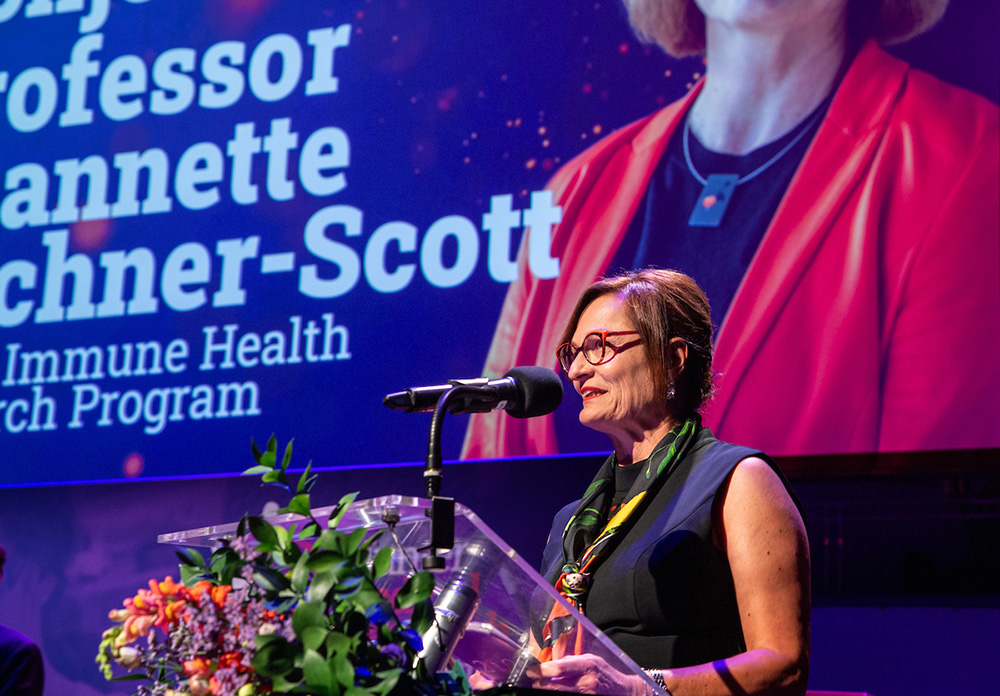 2024 HMRI Research Excellence Awards winners
2024 HMRI Research Excellence Awards winners
- HMRI’s Researcher of the Year: University of Newcastle Conjoint Professor Jeannette Lechner-Scott from HMRI’s Immune Health Research Program.
- HMRI Mid-Career Researcher of the Year: University of Newcastle Associate Professor Vanessa Murphy from HMRI’s Asthma and Breathing Research Program.
- HMRI Early Career Researcher of the Year: Hunter New England Local Health District’s Dr Carlos Garcia-Esperon from HMRI’s Heart and Stroke Research Program.
- Newcastle Permanent Emerging Innovator Award Winner: From Hunter New England Local Health District and a postdoctoral researcher at the University of Newcastle, Dr Joshua Fisher works in HMRI’s Mothers and Babies Research Program.
- HMRI Research Team of the Year: Telestroke Team from HMRI’s Heart and Stroke Research Program.
Conjoint Professor Jeannette Lechner-Scott
HMRI’s Researcher of the Year, University of Newcastle Conjoint Professor Jeannette Lechner-Scott from HMRI’s Immune Health Research Programis a highly respected neurologist with over 30 years in multiple sclerosis (MS) research and clinical practice. Now one of the largest in Australasia, her clinic supports over 1,500 patients across the Hunter New England and Mid-North Coast Local Health Districts.
Born in Germany, she earned her medical degree and PhD in pain pathways at the University of Heidelberg, before advancing her neurology training at the University Hospital of Basel, Switzerland. There, she joined Professor Ludwig Kappos’s acclaimed MS research team, co-led transformative MS treatment trials, and established a pain clinic that laid the foundation for her impactful MS career.
Meeting her partner and fellow researcher, Laureate Professor Rodney Scott, in 1998 Jeannette moved to Australia, founding a specialised MS clinic in Newcastle. She is also a co-founder of the Australian-New Zealand genetic consortium, contributing to the discovery of over 250 genes associated with MS, with implications for new therapies aimed at preventing disease-related disability.
A pioneer in MS epigenetics and lifestyle-based interventions, Professor Lechner-Scott is known for her dedication to patient-centered research. Her multidisciplinary team, incorporating clinicians and patients, ensures that her research not only advances science but directly enhances patient care and quality of life.
She holds numerous leadership positions, including Senior Staff Specialist in Neurology at John Hunter Hospital, Head of the MS Research Team at HMRI, and Chief Editor of MS and Related Disorders. She is also a Fellow of the Royal Society of NSW, an Australian delegate for the MS International Federation, and a board member of MS Plus.
Professor Lechner-Scott’s patient-centered approach has set new standards in MS research, making her a true leader in the field. The HMRI Researcher of the Year Award funding will enable Professor Lechner-Scott to secure a larger grant for a 10-year follow-up study of over 100 individuals with MS, investigating how MS lesions contribute to neurodegeneration and ageing.
Reflecting on her journey, Professor Lechner-Scott shared, “I started in 2005 with a small grant from Newcastle Permanent and the support of just one research nurse. Plus, my office was a broom cupboard on Level 2 of John Hunter Hospital. Today, I am proud to lead a large team of researchers specialising in clinical trials, genetics, epigenetics, novel MRI techniques, and large data analysis."
“This award recognises the dedication and hard work of my team and me in establishing Newcastle as an internationally recognised centre of excellence for MS research and delivering the highest quality care to over 1,500 people in the region living with MS,” Professor Lechner-Scott said.
“What's special about Professor Lechner-Scott is that she is a clinician-researcher, so she is right at the interface of where the innovation is for research in our ecosystem. So not only does she do important discovery research, uncovering the mechanisms and basic understandings about multiple sclerosis, but it's informed by her clinical work, and there's a very quick pathway for her to translate her discoveries into the lives of people experiencing multiple sclerosis. This award is in recognition of not just doing that once, but doing that over her whole career,” HMRI Institute Director and CEO Professor Frances Kay-Lambkin said.
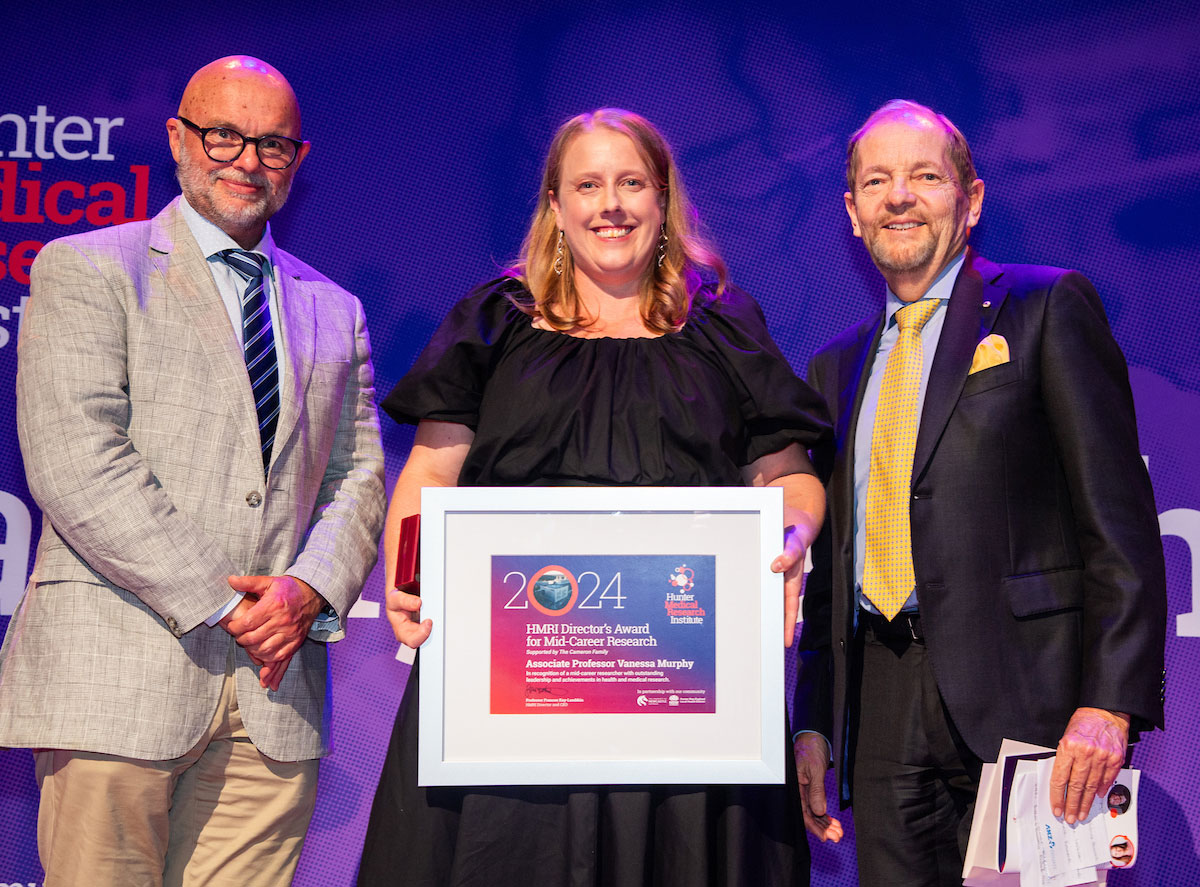 Associate Professor Vanessa Murphy
Associate Professor Vanessa Murphy
HMRI Mid-Career Researcher of the Year, University of Newcastle Associate Professor Vanessa Murphy from HMRI’s Asthma and Breathing Research Program leads a globally recognised research program focused on asthma in pregnancy and early life.
As the most common chronic condition in pregnancy, asthma affects 13 per cent of pregnancies in Australia and is linked to adverse outcomes including preterm birth, low birth weight, neonatal hospitalisation, congenital malformations, and gestational diabetes.
Associate Professor Murphy is an international authority on asthma management in pregnancy, and her work has significantly advanced the field. She led the Breathing for Life Trial, the largest asthma management intervention trial for pregnant women, which has informed clinical guidelines and policies in Australia, the Netherlands, the UK, and Germany.
Her research also led to the creation of the Asthma in Pregnancy Toolkit, the first comprehensive online resource providing evidence-based guidance for health professionals and pregnant women on asthma management.
"I was so excited to be a finalist for these awards as I have been applying for the past 10 years – ever since I became eligible to apply as a mid-career researcher! This is the last year I’m eligible for the mid-career category, so I’m so pleased to have made it to the finals,” said Associate Professor Murphy.
“Winning would truly be the icing on the cake for a successful year for my research team, and the grant money will enable the team to be highly competitive for the big grant rounds.”
“One of the things HMRI and our affiliate researchers are known for is our expertise and impact in asthma. So, it’s especially exciting to recognise one of the main contributors to this reputation and standing in our community, Associate Professor Murphy,” highlighted Professor Frances Kay-Lambkin.
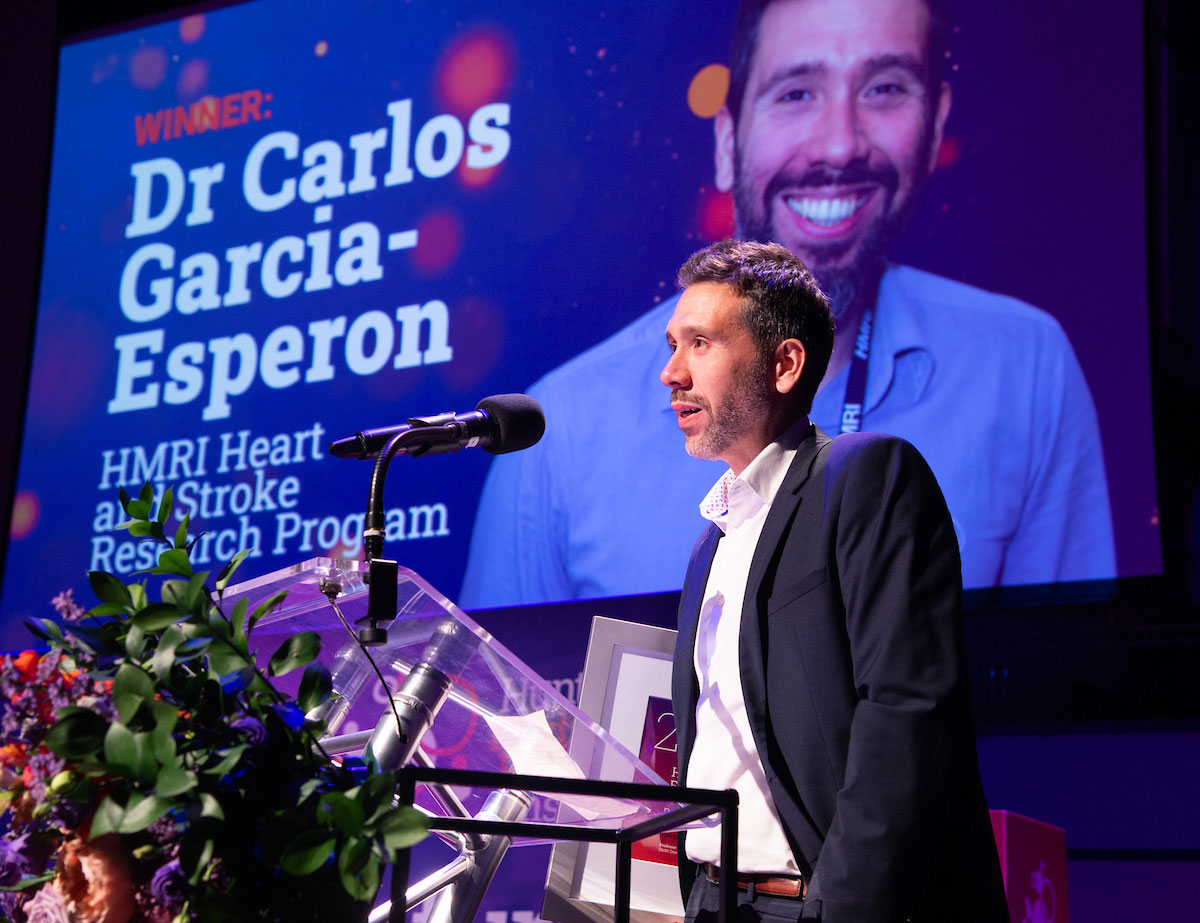 Dr Carlos Garcia-Esperon
Dr Carlos Garcia-Esperon
HMRI Early Career Researcher of the Year, Hunter New England Local Health District’s Dr Carlos Garcia-Esperon from HMRI’s Heart and Stroke Research Programhas called Newcastle and the Hunter region home since 2016.
Originally from Pontevedra, a small rural town in Spain near the Portuguese border, where his grandparents were farmers, Dr Garcia-Esperon has focused his career on improving access to stroke therapies for patients in underserved areas. Now a stroke neurologist and early-career researcher, he holds multiple leadership roles in stroke care and research.
Dr Garcia-Esperon completed his neurology training in Spain and Switzerland, followed by a two-year Stroke Fellowship at John Hunter Hospital, where he now directs Acute Stroke Services. He also leads the Hunter Stroke Services for the Hunter New England Local Health District. Beyond his clinical responsibilities, he is a Senior Conjoint Lecturer at the University of Newcastle, Treasurer of the Australian Stroke Academy, and a contributing member of various national and regional stroke networks, including the Stroke Network Agency of Clinical Innovation and the New South Wales and Queensland Telestroke Networks.
In collaboration with Professors Neil Spratt and Chris Levi, he helped set up a partnership between the University of Newcastle, HMRI, and the National Institute of Neuroscience in Dhaka, Bangladesh. Dr Garcia-Esperon earned his PhD from the University of Newcastle, specialising in brain perfusion imaging in acute stroke.
Dr Garcia-Esperonreflected on the significance of being named a finalist for the HMRI Research Excellence Awards, describing it as a major milestone in his career. “I arrived in Australia in 2016, planning to stay for just a year. But I fell in love with it, enrolled in a PhD program the following year while working as a stroke fellow, and things never stopped! I remember often seeing the names on the HMRI awards plaque and this would be an unexpected honour,” he said.
Dr Garcia-Esperon believes his upbringing shaped his passion for stroke care. “My grandparents were farmers in an area with limited access to specialised stroke care. Looking back, this inspired me to pursue a career focused on improving stroke care, particularly in rural areas, through telehealth initiatives. This recognition will not only help me mature as a researcher but also bring unique opportunities at both a personal and professional level, thanks to HMRI’s high visibility.”
“It's important for HMRI to recognise people at the most senior levels, but to make sure our early career researchers – who are at the forefront of our future impact – are supported and recognised early in their research careers. Dr Garcia-Esperon is already leading research in a critical area of strength and importance for HMRI in our community, and that's neurology and neuroscience. He's a clinician who has been working in our clinics at the John Hunter Hospital and is able to bring that perspective to guide the research questions and the impact that he's able to have in stroke,” said Professor Frances Kay-Lambkin.
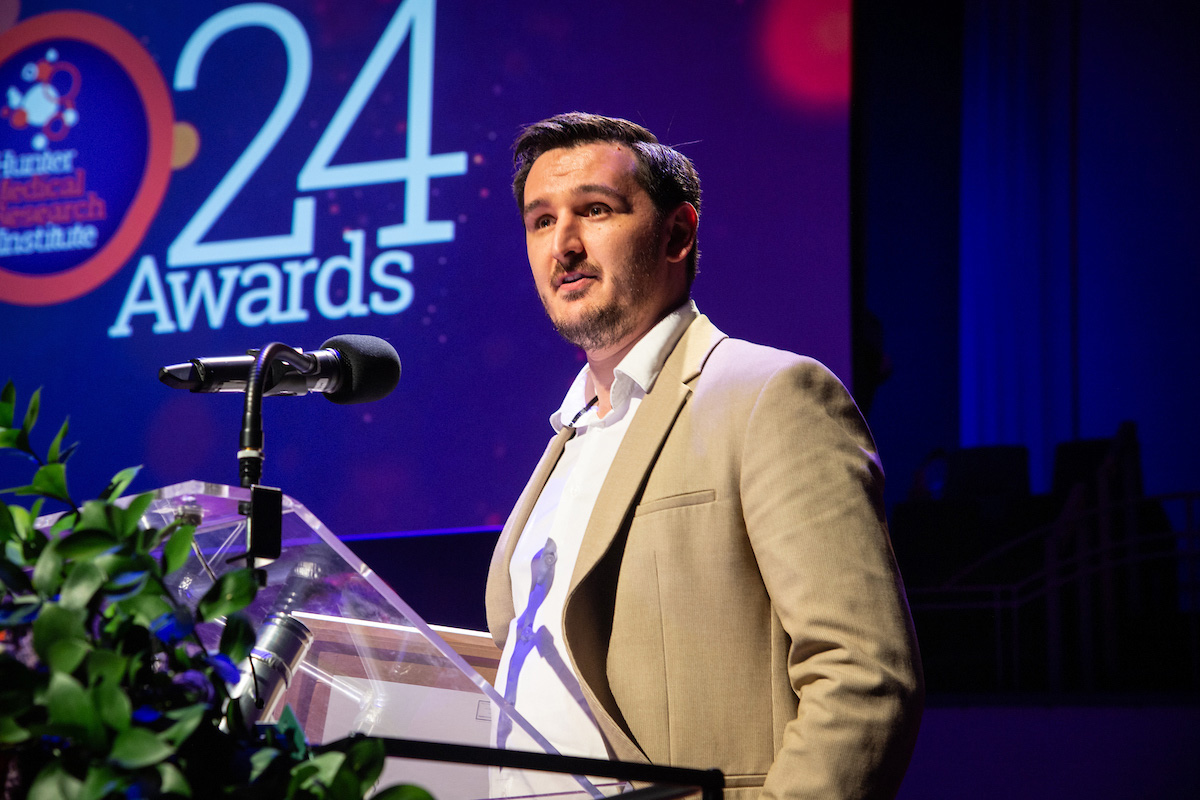 Dr Joshua Fisher
Dr Joshua Fisher
HMRI’s Newcastle Permanent Emerging Innovator Award was introduced as a key component of the Newcastle Permanent HMRI Innovation Partnership. This award celebrates innovation, spotlighting the achievements of Hunter New England’s most promising early-career researchers at a pivotal stage in their careers, with Hunter New England Local Health District’s Dr Joshua Fisher from HMRI’s Mothers and Babies Research Program the inaugural recipient.
Dr Joshua Fisher’s research into mitochondrial dysfunction in the placenta is advancing our understanding of the mechanisms behind foetal growth restriction (FGR) and stillbirth. His work focuses on bridging fundamental research with practical health applications to drive real-world change.
Dr Fisher has developed novel genetic biomarkers for FGR, explored mitochondrial-targeted therapies for its prevention and treatment, and advanced atomic-level imaging through cryoelectron microscopy and tomography. His findings reveal that placentas in FGR pregnancies show reduced mitochondrial function due to nuclear genome mutations, which disrupt the organelle's structure and impair placental metabolism and development; ultimately compromising foetal growth. He also discovered that FGR placentas have a reduced ability to synthesise foetal haemoglobin, leading to hypoxia and foetal distress. These insights are critical, as FGR currently lacks a known cause or effective treatment.
“Funding early career researchers ripples across the entire scientific and clinical ecosystem, supporting opportunities to challenge and positively disrupt dogma through innovation,” he said. “This award would symbolise the value of striving to achieve what ‘can’t be done’; a rewarding and exciting path to success,” Dr Fisher said.
A postdoctoral researcher at the University of Newcastle, Dr Fisher emphasised that the recognition was not only a personal milestone but also a platform to highlight the hard work of his students and express gratitude to the mentors who have guided him. He described the transformative power of funding early career researchers, noting how it amplifies the impact of fresh perspectives, unrestricted ideas, and innovative thinking, ultimately driving meaningful change in science and clinical practice.
For Dr Fisher, this award represents hope and progress in his research to reduce rates of stillbirth.
“It’s about uncovering the unknown causes, developing innovative detection methods to identify those at risk, and creating the first therapeutic interventions to treat or prevent the pathology,” he said.
"This funding could turn ideas into reality, shifting perceptions, adapting clinical guidelines, and changing lives."
Professor Frances-Kay Lambkin expressed her delight at the inaugural Newcastle Permanent Emerging Innovator Award, highlighting its significance in recognising groundbreaking research.
"This award marks the first time we've been able to specifically celebrate innovation in research, and it’s a wonderful outcome of our partnership with Newcastle Permanent. I’m absolutely thrilled that Dr Fisher is our first-ever winner. Josh is an exceptional early career researcher whose work within HMRI’s Mothers and Babies Research Program is truly inspirational. With just a bit of extra investment and encouragement like this award provides, he will continue to innovate at a remarkable level. We’re proud to honour his contributions with this award."
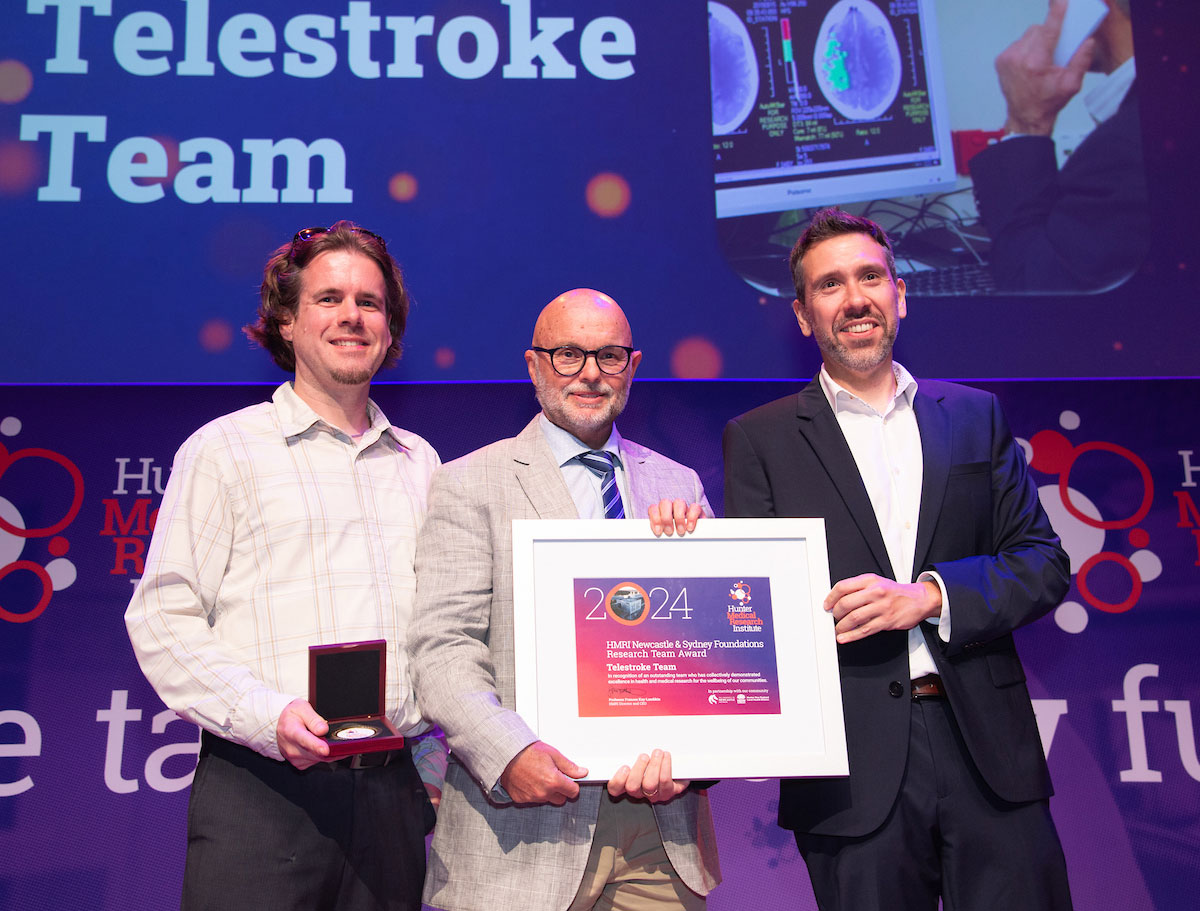 Dr Steven Maltby, Professor Chris Levi and Associate Professor Carlos Garcia-Esperon.
Dr Steven Maltby, Professor Chris Levi and Associate Professor Carlos Garcia-Esperon.
Telestroke Team
HMRI Research Team of the Year, is the Telestroke Team from HMRI’s Heart and Stroke Research Program led by Professor Neil Spratt in partnership with the HNELHD Acute Stroke Service led by Associate Professor Carlos Garcia Esperon. The Telestroke Team has spent over 15 years working together to pioneer advanced imaging techniques (CT perfusion – the brainchild of local innovator Professor Mark Parsons) to identify patients suitable for two emergency treatments that are proven to make a big difference for patients experiencing an ischaemic stroke.
The HMRI Telestroke team was the first in the world to establish the ‘telestroke’ model where smaller regional hospitals use advanced CT brain imaging analysis and consult virtually with a stroke specialist team, to urgently reviews patients and scans to guide the local treating team. These innovations have delivered rapid expert assessment, triage, treatment and patient transfer (when necessary) and real patient access to life saving therapies. The model of care has now been rolled out across NSW.
The Telestroke Team includes Professor Neil Spratt, A/Professor Carlos Garcia-Esperon, Associate Professor Ferdinand Miteff, Professor Chris Levi, Professor Mark Parsons, Dr Billy O’Brien, Dr James Evans, Kate Jackson, Jason Matthews, Dr Tom Lillicrap, Dr Pablo Garcia Bermejo, Dr Shyam Gangadharan, Dr Claire Sewell, Dr Mohammed ‘Abir’ Hasnain, Emma McCartney, Rachel Peake, Jaclyn Birnie, Sarah Edward, Dr Matthew Kinchington, Dr Iain Bruce, Michelle Russell, Dr Steve Maltby, Professor Rohan Walker and Professor Christine Paul.
“One of the things we like to do and be known for at HMRI is developing new models of care, new models of detection, and new models of treatment delivery. That's what's critical about the Telestroke team; it embodies what we do best at HMRI, turning discoveries into real world solutions that can take our clinicians' expertise and our research expertise out into the community and help people get access to treatment and diagnosis first,” Professor Frances Kay-Lambkin said.
HMRI is a partnership between the University of Newcastle, Hunter New England Health and the community.
Related news
- Heart Foundation joins forces with ‘No Money, No Time’ to improve Australians’ nutrition-related heart health
- Looking closely at wellbeing data
- Narrating Return at Newcastle Art Gallery
- Exceptional educators celebrated in national teaching awards
- Students, take the lead: how a peer-led program could transform our kids’ trajectories
The University of Newcastle acknowledges the traditional custodians of the lands within our footprint areas: Awabakal, Darkinjung, Biripai, Worimi, Wonnarua, and Eora Nations. We also pay respect to the wisdom of our Elders past and present.

